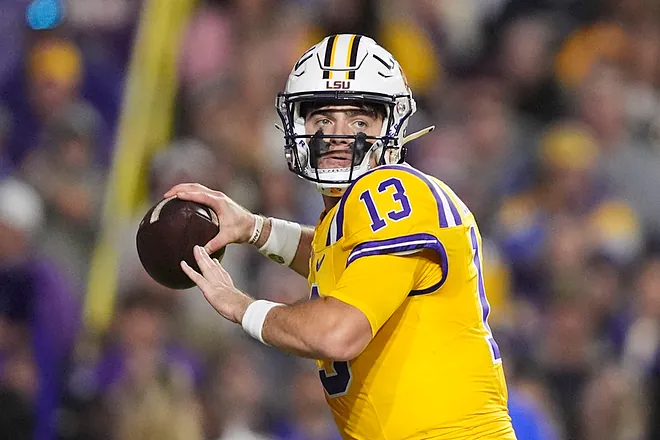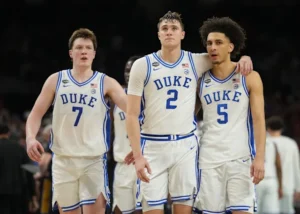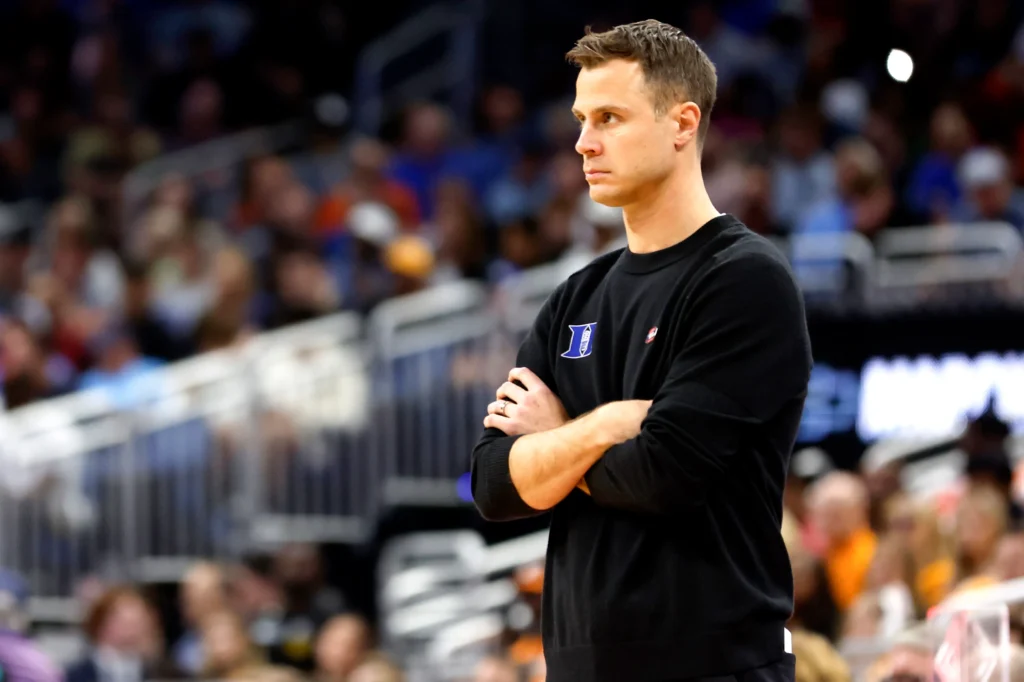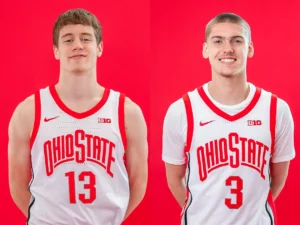
Garrett Nussmeier is not here to be the next Joe Burrow or Jayden Daniels. Instead, he is determined to lead LSU in a way that reflects his own strengths, personality, and long-game vision. That message came through loud and clear in interviews and press events, where the fifth-year senior quarterback rejected comparisons to his celebrated predecessors. The Burrow and Daniels eras brought Heisman campaigns, national titles, and NFL success—Burrow’s legacy culminating in an NFL championship, Daniels’ in Offensive Rookie of the Year honors. But Nussmeier is striking out on his own.
Nussmeier’s position within that lineage began quietly. He spent three seasons backing up Daniels and Max Johnson, earning respect for patience and preparation rather than spotlight moments. His time as a backup, including years behind Daniels, wasn’t wasted—it was formative. Coaches and teammates recognized his grit, film study habits, and composure. Joe Sloan, the quarterbacks coach, highlighted that Nussmeier entered this season armed with both preparation and experience—“playing develops experience in ways that practice does not,” Sloan said.
Belief in himself also came from setting LSU records. In his first year as a starter, he passed for over 4,000 yards, finishing second in single-season passing yards in program history—behind only Joe Burrow—while also ranking third in touchdown passes. He proved he could light up scoreboards, even when LSU struggled as a team. The performance corroborated his talent-rich potential and showed up in the eyes of analysts who noted Nussmeier had already outperformed Burrow and Daniels in their respective first years, counting volume of yards and touchdowns.
But even as stats piled up, Nussmeier remained grounded, declining to chase narratives tying him to those predecessors. Through national press conferences and media days, he emphasized one priority above all: being himself.
He said plainly that he didn’t feel pressure to emulate those before him, conveying a centered confidence in his identity. He spoke of trusting God’s plan and leaning into the values ingrained over his career. That felt less like humility and more like a statement—he is forging a new quarterback archetype at LSU, one built on preparation, poise, and process-oriented growth rather than flash or hype.
That mindset resonates with how he built his freshman and sophomore years. As a recruit, he entered as a gunslinger with arm talent—a nod to the Burrow swagger—but also with humility. He practiced like a starter even when he wasn’t, listening to veteran QBs and gleaning wisdom from his father, former coach Doug Nussmeier, and positional coaches. It paid off—his ReliaQuest Bowl debut against Wisconsin saw him throw for 395 yards and three touchdowns in a come-from-behind win. That performance earned praise from coaches as a composed, confident signal-call, remarking on his command of the offense and ability to deliver in the clutch.
It also invited comparisons—but he quickly distanced himself. Rather than embrace echoes of Daniels or Burrow, he celebrated the program’s elite quarterback lineage while defining his parameters. He said of Jayden and Joe: “I don’t feel the pressure to try and be the next Jayden Daniels or the next Joe Burrow. I’m here to be the best Garrett Nussmeier I can be.” At SEC Media Days earlier this summer, he reiterated that his focus was crystal: “LSU football,” not personal awards or narratives about being “the next big thing.”
Behind these words was tangible evolution. Sloan referenced areas for improvement in his decision-making and reads—“mistakes caused by rushed decisions and lack of poise” that Nussmeier is correcting through film review and offseason work. His attitude toward growth fits his own trajectory: a grinder who absorbs criticism and patiently chips away. His mindset diverges from predecessors who arrived with headline-worthy hype, choosing instead long-term process over short-term glory.
This focus isn’t theoretical. His on-field leadership stands out. In 2024, he suffered through a rough stretch—a three-game losing streak against top opponents, marked by turnovers—yet he emerged unbroken. Analysts noted that “if #13 had gone down…we may be looking at 5 or 6 wins” instead of nine, with Nussmeier described as “time and time again LSU’s best player.” He stepped into chaos and steadied the ship—an intangible trait often overlooked but critical for team culture.
The locker room is noticing. Brian Thomas Jr., a former teammate of both Daniels and Nussmeier, asserted that Garrett has the tools to replicate Daniels’ path—but only if he stays focused on the goal: a national title. Thomas emphasized Garrett’s steady progression: “I feel like he definitely can do the same,” but added that a title mindset must come first.
Head coach Brian Kelly echoed that. He likens Nussmeier to Daniels in mental toughness and process—but cautioned, “you can’t just get by on arm talent, you’ve got to be confident in your ability, have a great process”—words that align with Nussmeier’s own ethos. Kelly expects Nussmeier to build on his ReliaQuest Bowl success, to channel positive traits without trying to replicate Jayden’s mobility or Joe’s swagger.
That’s reflected in schematic adjustments. LSU offensive coordinators plan to tailor the offense to Nussmeier’s skill set—leaning into deep accuracy and timing, rather than heavy zone-read designed for mobile dual-threats. In turn, offensive line responsibilities shift to longer pass protections rather than constant scramble setups. It’s a transformation that goes deeper than play calling—it’s a signal that this quarterback doesn’t want a carbon copy offense modeled after the previous two.
In another layer of separation, Nussmeier has embraced a leadership style grounded in gratitude and faith. He references feeling “blessed” at LSU, thanks to trust in God’s plan and a family–driven work ethic passed down by his father. That spiritual grounding and focus on process echoes a subtle but significant shift away from modern college football flashiness and toward character-driven leadership.
That narrative has resonated with the LSU fanbase. On online forums and message boards, supporters pointed out his arm talent and SEC-leading passing numbers, projecting a breakout in his second full year—and noting his statistical footing is already comparable or superior to Burrow’s and Daniels’ first starts. The sentiment: he doesn’t need Burrow-style hype; he just needs continued growth and fewer mistakes. If he consistently reduces interceptions and improves red-zone decisions, his ceiling is high—potentially peaking as a Heisman candidate.
Collectively, the feedback triangulates. Offensive production is elite. Mistakes are fixable. Mental approach is grounded. Leadership is evolving. Coaches tailor schemes. The narrative around “the next QB in the LSU line” is fading—and a new one is emerging: “the quarterback that defines himself.”
The path won’t be easy. Expectations are immense, and LSU’s early schedule includes a tough opener against USC in Las Vegas. He’ll face SEC opponents with elite defenses, and the playoff conversation looms large. Few achievements carry momentum like a strong start. But Nussmeier’s calculated focus, personal identity, and support system position him well.
The key question: can he take what worked in Year 1, clean up inside-the-five mistakes, and elevate LSU from nine wins to a playoff contender? If yes, he’ll do it on his own terms—not as a carbon copy of Burrow’s swagger or Daniels’ dual-threat explosiveness, but as a quarterback defined by readiness, process, and quiet confidence.
That’s the core of his message. He’s grateful for the platform LSU provides—one that produced two NFL stars—but uninterested in pageantry. Tell me what I can do to make my team better. Coach me on reads, footwork, decision-making. Tailor the offense. I’ll carry the ball, or plant my feet. I’ll throw deep when it’s time. I’ll stay calm when it’s not. And I’ll build my own legacy in Baton Rouge.
In doing so, Garrett Nussmeier carries more than a playbook—he carries among the strongest quarterback traditions in college football. But his career trajectory, personality, and leadership philosophy mark a new chapter. This is LSU football, his way, rooted in gratitude, resilience, and clarity of identity. The comparisons to Burrow and Daniels may linger for now, but regardless of accolades or awards, Nussmeier is determined that when his LSU story ends, it won’t be written as an echo—it’ll be written as Garrett.







